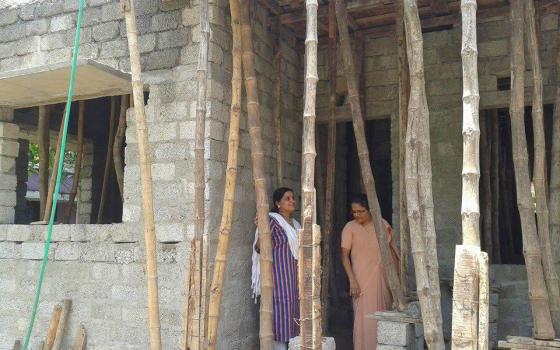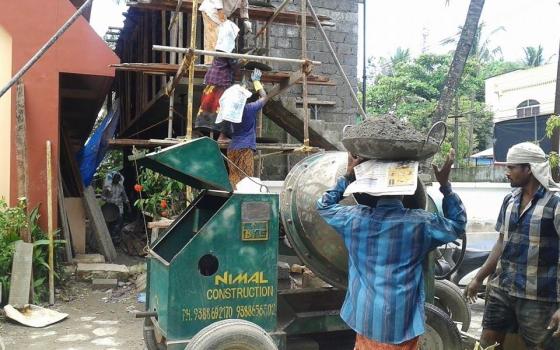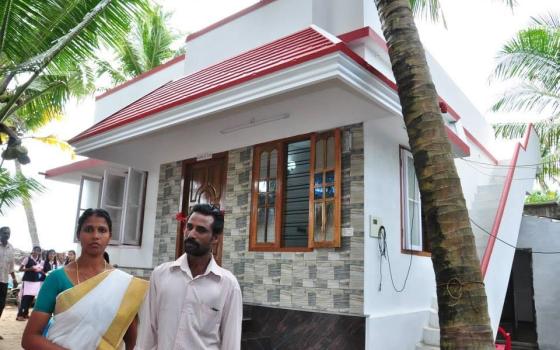For Sr. Lizzy Chakkalakal, building houses for those who otherwise cannot afford them is her way of participating in the "ministry of redemption."
The member of the Franciscan Missionaries of Mary, a religious congregation for women started in India in the 19th century, finds time to engage in this social activism in her busy schedule as the principal of Our Lady's Convent Girls Higher Secondary School, which is managed by her congregation in Kochi, the commercial capital of Kerala, a southern Indian state.
She founded House Challenge in 2012 and to provide houses for those who need them, mostly in the coastal areas of Kochi. The 47-year-old spoke to Global Sisters Report about why she combines teaching and social activism.
GSR: What motivates and sustains you to work for those on the margins?
Chakkalakal: Jesus has been my motivator and sustainer. He strengthens me to work in solidarity with the poor and the marginalized for their socioeconomic betterment and to generate in them a new life and hope.
The spirituality of St. Francis of Assisi and the charisma of our founder, Mary of the Passion, a daring visionary and missionary with a prophetic spirit, have influenced me a lot.
My congregation encourages its members to work among those deprived of social justice, human rights, human values and spiritual nourishment. Promoting justice, human dignity, harmony, and communion among people and communities is the basis of our socio-pastoral services. The Jesus values and Gospel values like love, justice, peace, care, concern and compassion for others, human rights, and dignity are at the center our activities.
How do you put this into action?
We seek the support of local churches and parishes and try to inculcate family values in our neighborhood. We also join interfaith initiatives and help basic Christian communities. We ensure that women empowered through our work become self-reliant financially and socially.
Why did you start your House Challenge? What is it?
The House Challenge was my response to the miserable condition of the homeless families of my students. After my formation and a training course in teaching, I was sent to Kerala to teach in our schools, although I wanted to be a full-time social worker. But as an obedient nun, I entered the education ministry. I tried to use various creative methods to be an effective teacher. One of them was visiting my students' families after class hours.
I found out that many students came from very poor families. I was shocked to see my girls living in one-room tenements that provided them little privacy. They lived without dignity and security. I was disturbed and distressed. Many people in the coastal areas of Kerala suffer from alcoholism and drug addiction, and the most vulnerable victims are women and children.
The main purpose of education is the integral and holistic development of every student. I realized these students cannot attain this objective without some basic facilities in life. One cannot grow with self-confidence and dignity living in such pathetic conditions. It made me search for solutions.
In 2012, I started House Challenge based on the principles of early Christian communities who had a strong sense of care and concern for each other, and they provided mutual spiritual and material support and shared between the haves and have-nots.
How many houses have you built so far?
We have completed 45 houses so far, and six houses are under construction.
How are families chosen to own the homes?
We follow a democratic, collaborative process, and our beneficiaries are chosen irrespective of caste, color, creed or religion. We find deserving cases through screening by the local self-government bodies and municipal bodies. We also identify deserving people when we visit the families of students.
Where does House Challenge operate?
The project works in the coastal areas of Kerala, mainly in Kochi, where women, widows and children are victims of alcoholism by men in their families [as well as of] poverty and financial insecurity.
How do you raise funds for the project?
We start every house construction with the little sharing of our students in the school. We have a one-rupee sharing every week among the students. Our teachers, students, and parents sacrifice by not celebrating their birthdays, wedding anniversaries and so on. They give a part of the savings for House Challenge.
Some businessmen give materials or money. The government also supports us. Our former students, teachers are also active participants. We also get donations from philanthropists. Employers from different departments, such as police, social service associations and clubs, also share part of their salaries. As a whole, we create a culture of sharing and caring. House Challenge survived four years merely on sharing.
Does your housing project work with the government and the church?
Yes, we do get support from the church through the financial contributions. We are also supported by several bishops, including Cardinal George Alencherry, major archbishop of the Syro-Malabar Church, who appreciates and supports us. Some congregations have also supported us by helping construct two houses.
Such support and acceptance gives me confidence to go ahead with this just cause. I do believe that in the name of the Lord, everything is possible. Think well, speak good, do good: This is our leading slogan. Any challenge can be overcome with faith in the living God, who gives us courage and who does everything for good.
Does your congregation support your work?
My provincial, Sr. Pushpa Joseph, gives me great support to take any creative and innovative initiatives. Sisters from my community cooperate and participate in this ministry of redemption.
I have received a lot of positive support by society, too. I have received a number of awards, like Best Teacher Award, District Collector's Meritorious Service Award, Best Social Worker's Award, and honors from different organizations and institutions.
What else are you involved in?
I have initiated a program called Friend of Friendless. Under this program, we visit families of those who are terminally ill in the hospitals and provide them with spiritual and material support.
During the last Christmas celebrations in the school, we hosted the poor terminally ill patients as friends, especially those who live in isolation and are confined to bed for a long period of time. We welcomed them as our friends for Christmas and offered them gifts.
Another initiative is Mary of the Passion Higher Education Scholarship Project. We introduced this scholarship in our school to support our former students as well as those academically proficient who cannot afford higher education. We have selected 13 students who have single parents to complete their professional courses.
Why is your school known as Socio-Friendly School?
We organize a variety of outreach programs to inculcate in students love, sharing, compassion, team spirit, fraternal sensitivity, and other values that lead to personal commitment and social responsibility.
We have also introduced Eco-Friendly Lifestyle Project. It aims to create awareness among students and their families on the environmental issues, thus promoting a culture to nurture nature.
Last year, we organized a flower show and a home-garden competition. Each student was asked to create a garden at home, and on the World Environment Day, we asked them to bring a plant to exchange with their friends. Besides, a school garden was prepared by the planting of a sapling by each class. When they returned home, they carried a new plant with them and planted it in their home garden.
On Nov. 15, the feast day of our congregation's founder, they brought flowers from their gardens for a school flower show. The best class was awarded a prize.
The school also received the Best State School Award from the Latin Catholic Association and an award for the school's social commitment from the Malayala Manorama, the leading daily newspaper of Kerala.
What are your future plans?
I intend to continue as an educationist and do my social work for the poor and the downtrodden people. I pray to God to enable me to teach and nurture my students and help build as many houses as possible for the poor and needy.
Tell us about your childhood and growing-up years.
I was born in Thrissur, Kerala, as the sixth among eight children. All my siblings are married and settled now. My parents, who are no more, were the visible signs of the invisible God who taught me how to love and share. They gave me good faith formation through their own exemplary life. We were very active in the parish as we were a very church-oriented family. We were blessed with lot of opportunities to grow with our gifts and talents that helped me a lot later in my missionary life.
What drew you to become a nun?
My mother was very particular that her children must attend Mass daily, as our parish church was close by. I was very much attracted to the Jesus on the cross. At the age of 12, during Mass, I was drawn by the wounded Jesus on the cross. I asked myself why such a young and handsome man could undergo this brutal death, why Jesus had to suffer and die on the cross.
This question lingered in my mind. After a few days, I got the answer through an inner voice. The answer was that Jesus died on the cross for me. I was shaken by this answer. Then onward, I was filled with a spirit of gratitude, and I deeply desired to express my gratitude in a visible manner and looked for ways and means to thank him for sacrificing his life for me. I found nothing other than offering my own life to him as a response to his redemptive love. I wanted to give my life for others as he gave himself for me. It was the promise that I made to him. I knew nothing more than that. But today, I realize that it was my foundational experience of God.
After completing high school, I wanted to become a religious nun. I preferred a missionary congregation in order to go all over the world to proclaim the love of God that I experienced through his son, Jesus. But my parents did not allow me to leave the family so early. So they forced me to continue my studies for another two years. I again expressed my determination to join a missionary congregation, and my parents agreed. I joined the Franciscan Missionaries of Mary in 1986 with the help of my mother's friend and classmate, Sr. Maria Chakkappan, who became my vocation promoter.
I grew up like other children, but I always had an inner world and inner space for Jesus in spite of my playful and naughty nature. I learned to care for the poor from my parents.
[Philip Mathew is a journalist based in Bangalore, southern India. This article is part of an ongoing collaboration between GSR and Matters India, a news portal that focuses on religious and social issues.]





